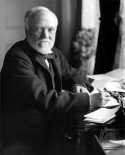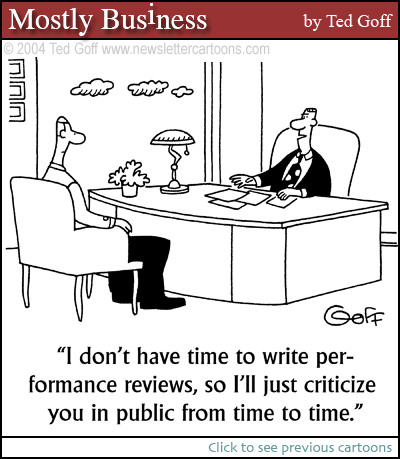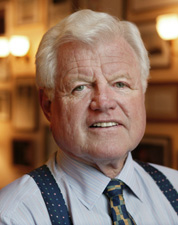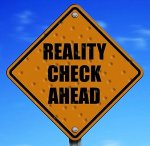Posts filed under ‘Habits’
Five “Laws of the Mind”: Words of Wisdom from the Past
 By Joyce Friel
By Joyce Friel
Andrew Carneige’s impact on the US is still evident in many ways today. In particular, the great buildings he provided for cultural advancement as a way of giving back to the community. He had 5 ‘laws of the mind’ he used to guide his focus and, consequently, drive his results. They are just as appropriate today as they were in Carneige’s time.
They are:
1. Fix your goal firmly and precisely in your mind. Precision is key.
2. Determine what you intend to give in return for reaching your objective. In his case, it was often buildings and public works. So clearly giving back was a key ingredient to his success, it wasn’t just a nice thing to do with his wealth. When you give back, others continue to use your services and products so a self-fulfilling prophecy gets established.
3. Establish specific dates when you intend to have achieved your goal.
4. Create a definite plan and commit it to writing.
5. Read your plan twice a day. Keep it top of mind. What you focus on is what you get.
Great words to live. And there is tremendous evidence that Carneige’s formula works. What is the goal you want to achieve. How about using this 5-step plan to make it become a reality!
America’s management practices: Remember…you can’t change organizational behavior without changing human behavior!
 The mainstream seems to be finally catching on… After decades of unchanging business management practices that American businesses have, by habit, been repeating, (layoffs, performance reviews etc.) we see now that these methods are at best unhelpful, and at worst, destructive to employee motivation. What changes organizations? Changing human behavior!
The mainstream seems to be finally catching on… After decades of unchanging business management practices that American businesses have, by habit, been repeating, (layoffs, performance reviews etc.) we see now that these methods are at best unhelpful, and at worst, destructive to employee motivation. What changes organizations? Changing human behavior!
An interesting list of 13 common, habitual practices our nation’s management uses that don’t work:
From Business Week, by Aubrey C Daniels, to read full article go here: http://www.businessweek.com/managing/content/aug2009/ca20090811_861931.htm
With executives under fire for driving their companies into the ground—and taking the economy with them—it’s time for a managerial paradigm shift that focuses on the root of all booms and busts: individual behavior. Many time-honored management practices, such as layoffs, yearend bonuses, and automatic pay raises, actually reward employees’ bad habits and punish good behavior, often with devastating results.
These practices stem from theories of performance that have little to do with the science of learning. As such, they result in many mistakes initiated by senior leadership at great cost. They’re endorsed for the best of reasons but fail to lead to the desired result.
So why do so many organizations continue to embrace faulty practices? My 30 years of experience with Corporate America have led me to believe most business leaders are trained in the math of balance sheets, not the science of human behavior. They don’t understand that you can’t change organizational behavior without changing human behavior. Only when managers understand the basic principles of behavioral science and apply them skillfully will they realize the full potential of their employees and their organizations.
A Chance for Change
While management in general is proving challenging today, there is a silver lining to this current economic crisis: It provides a rare opportunity for managers to rethink and reform the way they run their organizations, using an approach grounded in science and research rather than in dubious habits. Businesses have been wasting time, funds, and resources on the same tired approaches for years. This crisis can actually provide us with a chance to start fresh and set in motion a sea change in the way we manage behavior and performance.
Please see a slide show featuring 13 universally used, but ultimately ineffective, management practices—and prescriptions for how to change them.
What lessons can we learn from Ted Kennedy’s leadership style?
We came across this great article posted by Rosabeth Moss Kanter on her blog  http://blogs.harvardbusiness.org/kanter/ and we wanted to share. From Kennedy’s life we can take away some significant leadership lessons: leading with a purpose, making a difference, perseverance, staying true to roots and family: these qualities in leadership truly matter and are worth cultivating in our own quests and lives.
http://blogs.harvardbusiness.org/kanter/ and we wanted to share. From Kennedy’s life we can take away some significant leadership lessons: leading with a purpose, making a difference, perseverance, staying true to roots and family: these qualities in leadership truly matter and are worth cultivating in our own quests and lives.
Ted Kennedy’s Leadership Lessons By Rosabeth Moss Kanter
Senator Edward M. Kennedy, whose loss America is mourning, was no darling of the traditional big business community. He fought for the little guy, for children, for the poor and disadvantaged, sometimes against establishments and elites.
But as a leader, he was greatly admired across the political spectrum. Even those who disagreed with his politics can draw inspiration from his life. From knowing and observing him, I choose four leadership lessons I hope executives will take to heart.
Remember that performance is everything. No one is entitled to a position. When Ted Kennedy won his Senate seat for the first time during the Presidency of his brother, Jack Kennedy, critics said that he inherited his position in the family business and bought his way into the Senate through favoritism. Critics dismissed him as a weak younger brother who would be merely a celebrity Senator. How wrong they were. Ted Kennedy’s route to the Senate stopped mattering once he began performing for his constituents and collaborating with his colleagues.
Kennedy did not rely on dynasty as destiny. He rolled up his sleeves and mastered the details, and he kept studying and learning as the issues changed. No one is entitled to a top executive position; everyone has to earn it through his or her deeds, and each is only as good as his or her command of the issues. When Mitt Romney challenged Kennedy for his Senate seat in 1994, the pivotal moment of their debate — which probably won Kennedy re-election — involved Kennedy pressing Romney for specifics on his health care plan, with Romney finally admitting he hadn’t worked out all the details. “Well that’s what you have to do with legislation,” the Senator replied. Kennedy knew the job. His career rewards followed from his service. His career rewards followed from his service.
Even when Kennedy could not move the needle forward on really big change (health care reform), he supported incremental improvements (children’s health insurance), which meant that he survived in office long enough for his big agenda to come close to being enacted.
Find a higher purpose. Think values first, and suspend ego.Ted Kennedy believed in public service as an honorable profession and in government as a vehicle for helping all citizens get their chance for high quality of life. Once he found his core mission (after losses and setbacks), it was clear where he stood and who he stood for — other people who needed a voice because they couldn’t always speak for themselves.
This was not about Ted Kennedy or his ego. He was known for humility, graciousness, and geniality in the Senate; he was not engaged in partisan contests to win for the sake of winning. The goals were so important that he was willing to work with political opponents to reach agreement on measures that served the people. His work with Republican Senator Orrin Hatch was a model for collaboration that transcended ideological disagreements. He supported President Bush’s No Child Left Behind legislation for school reform; the cause of children was so important that he would rather compromise and get a little something done than prevent any action. Negotiating by calling on higher principles made him effective with principled members of the other party.
Business leaders who operate from a sense of values and purpose — a theme of my new book SuperCorp — are similarly able to win adherents and negotiate better deals, because they suspend ego in support of a cause larger than themselves. By working for others rather than scrambling for career advantage, they enhance their own reputations. And the work is more important than title or position. Ted Kennedy will go down in history as the Lion of the Senate and one of the most important figures of our time, although he was not the President, nor even the “CEO” of the Senate or his party. His mission gave him moral power as important as position power.
Keep going. Ted Kennedy faced numerous public crises, any one of which could have destroyed him, yet he proved resilient and able to learn. Through strong efforts on behalf of the greater good, he restored confidence in his leadership. The still-mysterious incident at Chappaquiddick in which a young woman drowned nearly drowned his career, too; far from showing courage, he ducked accountability. But Kennedy bounced back by redoubling his efforts to do his job well. He fumbled in his bid for the Democratic Presidential nomination in 1980, but recovered by devoting even more energy and passion to his work in the Senate.
Never forget family. The hard-working Kennedy was a model for executive dads. De facto father to several touch-football-game’s worth of children (his own and those of his late brothers and formidable sisters), he organized weekend outings to Civil War battlefields and made sure they studied their history lessons. Family was at the center of his satisfaction in life. At the Kennedy compound at Hyannis Port, which I toured with him, he showed pictures of the late President John F. Kennedy and late Attorney General Robert Kennedy and talked of them as if still alive. The consummate professional whose greatness grew every year was still, at heart, a family man. His concern for relationships, and the love that guided his family through numerous tragedies, gave him the strength to take on tough challenges.
Business leaders should heed that lesson above all: Performance, mission, and endurance are possible because the people we support and care about also support us.
212 Degrees to Boiling
We wanted to pass along this very short inspirational movie/video… at 211 degrees water is HOT, but add one degree, and at 212 degrees, water boils, produces steam and can produce enough energy to run a train! This is worth watching… it takes EFFORT, ENERGY and WORK to be great, produce results, make a difference… to change your life!
Learning to Lead
 Leaders learn through experience.
Leaders learn through experience.
One of the key characteristics of leaders is that they are learners. This can be readily discerned when interviewing an espoused leader by asking the question, “Tell me about a time you failed as a leader and what you learned from it?”
If they can’t identify a time, be cautious. The reality of their leadership capability may be only in their mind and not exhibited in their behaviors.
Experienced leaders who have been tested in the crucible and made it through can easily remember examples of where they have not been effective or failed in their leadership. And, they can share with you what they have intentionally done or changed to adjust for the failure based on their learning. These changes will usually be in their beliefs about people or in their behaviors when leading people.
I well recall an instance when I first started in supervision and had a group where significant change was required to expand the departments capacity for work. I was to lead this change and managed to get through it although I lost the department’s best performer. I attributed this lose to her lack of interest in using the new technology we had implemented.
Months after the change a friend of mine suggested that people in this department felt I was not fair, too pushy and caused the person to leave based on the unfair expectations I had placed on her for work output. This feeling was still being harbored in the group today.
In short, I asked the group to hang around after work one evening and asked them their thoughts regarding what I had heard. What a great learning experience! I had been a lousy leader, even though I got the job done.
I called the person who left and apologized for my poor behavior, and she agreed to come back to work for us. From that point on, I led in a much more open, involving and trusting manner where people were asked for input, allowed to volunteer for assignments, could suggest better ways to accomplish tasks, etc.
Never again did I think I knew all the answers, and never again did I take advantage of top performers by overloading them with work.
Looking back, it doesn’t seem like much, but today, I know it has shaped my leadership style and techniques as much as any failure I have had since that time.
What leadership failures have you learned from? (BTW – this could be called failing forward if it helps as a memory tickler)
Chad
How you respond to the economy is a CHOICE
 I believe there are three key measurements for today’s uncertain economic environment.
I believe there are three key measurements for today’s uncertain economic environment.
1. Accelerating pace of change.
2. Our key response is fear, anxiety, insecurity, which according to Bright Side’s research and interviews is increasing.
3. The key sustainable advantage is our expanded capacity to learn/unlearn/relearn in the moment every moment.
Today’s recession reminds me of experiences I had over 25 years ago when I developed Bright Side’s personal change-leader model to expand my own capacity and the capacity of others, their teams, their organizations to be more equipped to lead toward the future dreams and desired business outcomes. My past experiences, both my past positive experiences and my past negative experiences continue to be triggered for me today and could limit or minimize the impact that I personally can and want to have and Bright Side can and wants to have.
And how I respond to those triggers is a choice: Yes, the recession is knocking on my door and I am choosing to not answer it.
The personal leader model is as relevant today as when I lost my job in the machine tool industry during the early 1980’s. Not only did I lose my job, I watched an entire industry collapse. I, along with many other Americans, was stuck in a view of arrogance, ‘Ohio is the machine tools capitol of the world, other countries make junk.’ After traveling to Japan in 1981, working with the Father of Quality, Dr. W. Edwards Deming, I began to wonder, have an insight, that perhaps I was experiencing the early side of a trend and I could ignore it or learn about it and take action to embrace and lead from that trend.
That failure became the impetus for the Bright Side model…
The Strength and Leadership of Women
 This is an excerpt from a workshop presentation I recently gave at a Senior Executive Women’s Event for a Fortune 50 company…. here’s just the beginning… Donna Rae
This is an excerpt from a workshop presentation I recently gave at a Senior Executive Women’s Event for a Fortune 50 company…. here’s just the beginning… Donna Rae
“Keep your face to the sunshine and you cannot see the shadows’, composed by Helen Keller, more than 50 years ago has inspired me throughout my life.
Helen Keller, encumbered with an inability to speak, see or hear, become one of the world’s most inspirational voices – and most heard voices.
Helen Keller, a voice of courage, ensuring her voice was heard.
Like each and every woman today, Keller realized amazing accomplishments. To be here, we all have accomplished much, aspire to go beyond, and perhaps we have daring dreams. Yes, we have come along way by overcoming barriers and still confronting barriers today.
I believe the world needs women, the voices of women, and the intrinsic strengths of women more today than ever before. Our intrinsic strengths of connecting, collaborating, open & transparent risk taking, learning from our failures, our insightfulness, deep intuition, and our capacity to be voices of persuasion with the utmost of integrity.
And today provides an opportunity, a personal leadership experience, for our presence, our voices, and our natural strengths as women to be heard.
During today’s session, I will provide you with interactive experiences and tools to expand your personal leadership capability in new and different ways. I will also provide you with a personal leader development model that you will be able to immediately take into action once the session ends.
Even though you do not know how the next two hours are designed, I would like you to reflect on what would make this event meaningful for you personally. And for you to have that meaningful outcome, what are you willing to do to make that happen? What are you willing to do, think, say, ask – that is different – and is a stretch for you?…”
Context – An Empowering Enabler
 Disempowered people work in a vacuum. They do what they are told and are limited to taking safe, prescribed actions and making secure, pre-approved decisions. They have no need for understanding the context within which they take action. Some roles require this type of standardization and control. They are roles that eventually will be automated or disappear as systems and infrastructure mature to where the roles are no longer necessary.
Disempowered people work in a vacuum. They do what they are told and are limited to taking safe, prescribed actions and making secure, pre-approved decisions. They have no need for understanding the context within which they take action. Some roles require this type of standardization and control. They are roles that eventually will be automated or disappear as systems and infrastructure mature to where the roles are no longer necessary.
For more mature roles that require independent action, problem-solvingand decision-making a more empoweringand enabling model for performance and accountability is necessary. Leaders need to provide context for these individuals so they can act without seeking approval every time a decision is required, and so that they can take action that best serves achieving the future state desired by the organization.
One powerful technique for helping these individuals perform within the parameters and in support of the direction the organization has chosen is to share the vision for the future that executive leadership has defined for the organization.
At the same time, a solid understanding of the current state in which the organization finds itself is important to understand such that the gap between the the present and the future is grasped and owned by those who must make independent decisions regarding how to move from where we are today to the future vision we have for the company. The key component of engaging others is necessary at this point as well as empowering and enabling.
We call this understanding of the current state, future state and gap – CONTEXT – because it provides high level awareness that clarifies direction, and paves the way with key strategies and behaviors required to move in a straight line toward the future in an accelerated manner. In essence, it builds a road from the current state to the future state, puts curbs on the road to keep people on the straight path, and equips them with maps, mile markers, gas, vehicles and behaviors – the resources necessary to assure the future destination is reached in a sustianable and accelerated manner, with as little resistance as possible.
Frequently, in our behavioral interviews of employees we find that people may not know the future state clearly and are operating to specific goal achievement only. They tend to operate with blinders on and march to the beat of only one drum.
In some cases, we find employees who seem to have a grasp of the future vision and are moving very rapidly toward it and outpacing the capability of the organization to support this movement. They seem to have no concept of the current state and are building unsustainable solutions for the future.
Lastly, we often find people who are off target completely and operating to historic precedence or taking independent actions that are in the wrong direction from the future vision, or tangential to it. They are slowing everybody down with their misapplication of resources.
All of these people are working hard and in some cases are working harder than they ever have in the past. Unfortunately, they are not really contributing to achieving the future state in a sustainable and accelerated way.
They need to understand the higher level context of where they are, where they are going and the key strategies and behaviors that are supported and resourced by the organization to help them get there
As a leader of leaders at all levels, context is one of the critical components when it comes to empowering and enabling others. Keep it in mind as you lead others to a new future for your organization.
What other aspects of context would you like to share?
Chad
Personal Productivity
Personal productivity is something toward which we all strive. We want to be able to accomplish more in a shorter time span and focus longer so we can strategize and implement better. We want to rid ourselves of all the small distractions and time-wasters that always seem to add up to more than we think. Before we know it, it’s 2 pm and we haven’t accomplished half of what we needed to that day.
Those of you wishing there were 25 hours in the day should listen up, because personal productivity is attainable. All it requires is a mental shift and change in daily behaviors and habits. Sound difficult? There is a simple method to obtain it if one is armed with an open-to-change attitude.
When Bonnie Curtis, Vice President of Global Oral Care at Procter & Gamble, charged her team the task of eliminating one hour per day of distraction and inefficiency during the merger with Gillette, she knew she was not assigning an easy task. Changing behaviors is something that takes time and dedicated repetition.
Curtis knew she wanted to change her team, but she also realized that she wanted to change how she personally worked within her team. For her, it was more than eliminating one hour of inefficiency per day. She took a look inside and objectively observed her actions and methods for work.
She wasn’t being as effective, she noted, if she held a grudge toward a person or kept a mental tally of errors. Her personal barrier against a colleague would prevent her from moving forward on a project or even talking to the person.
Curtis was also spending less time with her family. She consistently missed dinner, was absent at important sporting games and events for her children, and was distracted on the weekend. She wanted to be more present with her family and she knew something needed to change, which was Curtis’ first step in the right direction. By forming an awareness around what needs to be done, she was on her way toward personal change.
Curtis needed to release any tension she felt about her current state so she could reach her personal ideal future state: an 8-5 day that allowed her time with her family in the evenings and during the weekends. She needed to bridge the gap between her current state and ideal state. Once she formed an awareness around these dormant grudges, Curtis plowed forward and was able to work more effectively.
She replaced her personal barriers with optimism and the idea that she is a bold change leader, able to move her team forward but still keep her personal boundaries more intact. She built upon her own inner tenacity and launched forward, running herself through the Bright Side model anytime she needed to rid herself of barriers and distractions.
What about you? What will it take for you to rid yourself of personal distractions and inefficiencies?
The key to remember here: form an awareness on your current state, release any tension, replace it with the ideal, future state, and build upon it so that your change is sustainable and real.
-Shannon
Emotions Engage

Be it passion, fear, hate, love – emotions engage others.
A hallmark of best in class leaders is their ability to connect and engage others with committing to and moving toward a vision for the future. They do this through rational/logical structure and emotional/behavioral connections.
The rational/logical side of the equation is the typically used explanation and depiction of what is to be accomplished if the strategy, process, task or service change is to become reality. This rational/logical approach to engaging others is only one half of what it takes to be successful as a high-performance leader.
Unfortunately this is the dominant form of leadership used in operational aspects of most businesses. It’s not until leaders advance to the more strategic levels that most understand or employ the balanced form of leadership.
Think about it; People can quite easily understand why things need to change and may buy-in that it will be a good thing to do. They may even say, “Yes, I think it’s a good idea and support its accomplishment.” But do they really commit themselves to doing the best they can and contributing all they have (physically, mentally and emotionally) to achieving the desired outcome? Or, do they comply and physically do the work without really engaging mentally or emotionally? Sometimes no, sometimes yes. It depends on whether they have a reason to believe. Do they really have a reason to believe the change or vision is going to contribute to some benefit they believe in, one of their values, does it align with a concern or fear they are feeling based on their perception of the present status quo. Do they really want to undertake the effort, risk, insecurity and work involved in making the change happen? Do they buy-in? Do they emotionally engage themselves with the vision or change?
It all depends on the leader and this is what the best-in-class leaders do so well. They share their emotions in transparent and authentic ways through their behaviors such that others can feel their concern, desire, commitment, and passion. They balance the rational/emotional equation and gain the power inherent in both aspects of what makes us human (rational and emotional).
This balance of the two sides of what makes us human appeals to the human side of others who more rapidly and in a deeper way commit to follow the leader and make the change or vision become real, because it is their vision as well. In essence, the leader has created a reason for them to believe in the future based on both the rational and emotional aspects of the change. The people have made the change/vision their own and will now move in a parallel direction with the leader. It is no longer just the leaders desire; it is the followers, as well.
Some call it Servant Leadership – I believe it is reflective of a Connected/Balanced Leader who is leading from his/her whole being versus only the rational/logical half.
What are your thoughts?
Chad
Adjusting My View of Current Reality
 I just read an article that caused me to adjust my view and filters regarding current reality.
I just read an article that caused me to adjust my view and filters regarding current reality.
The article had research information about our current economy as well as information about our economy over the past fifty years.
Without getting into detail, it said we have been experiencing an anomaly during the past fifty years in that the economy was in a continual expansion mode (a few justifications and reasons for this were provided), and that our current economy is the reality of what it will be like in the future.
Well!!! This article caused me to contemplate what that could mean for leaders moving forward.
- Few to no leaders have experience from fifty years ago that aligns with the business needs of today’s reality – we are currently learning to lead in new and different ways as we experience day to day revelations in this new economic reality.
- A recalibration of what success looks like, sounds like, feels like and is measured like will be necessary. This will vary by the industry, function, situation in which leaders find themselves.
- The way in which people are led will be different in that aspirational career growth, positional movement, personal development, travel globally, compensation adjustments, etc. could be reduced or not available due to tighter management of budgets.
- Limited inventories and options will create the need for true leadership in selling versus order taking. Increased competition for discretionary monies will also require selling to step up and lead.
- Marketing will take on a different look as more targeted messages are designed for smaller, unique populations. Again, reduced budgets could drive an increased need for greater ROI per customer, so targeting to higher potential buyers will be necessary.
- Adroitness with new and existing technologies will be required to do more with less resources and increase the need for “high tech touch” to lead disseminated audiences of employees, customers, consumers, suppliers, collaborators, partners, etc.
- Leaders will be required to become very good at providing clarity of direction, priority, focus and metrics in order that these dispersed audiences can operate independently and still stay aligned with the organizational imperatives. Partnering beyond the traditional company boundaries will also require sharing these aspects of leadership with non-traditional entities in order to compete effectively.
- Leaders will also have to be better coaches, supporters, barrier-breakers and reinforcers of empowered followers in order to reduce errors and potential failure modes of operations as followers get up to speed and become leaders in their own business arenas.
- These more micro-focused organizations will require a strong core of strategic structure and infrastructure from which independence can be enabled in order to make better decisions at the point of performance, move with speed and agility, and maximize the cost/service/quality requirements of the target audience.
- Not to mention the leadership challenges for supply chain partnerships, purchasing reciprocity, legal licensing, financial refocusing, benefits contracting, recruiting & hiring, etc., etc.
I believe every strategic and functional aspect of how we have done business in the past is changing and that strong, agile, open to learning leadership will be required to challenge and adapt to the new economy as we move forward.
Okay, I shared some of my thoughts and filter changes.
What additional adds do you have based on our economy being more of the same as we have had this past year (2008-09), versus being the double-digit growth, fat and happy economy we have experienced since the 1950’s?
Chad
A Reason To Believe
A REASON TO BELIEVECandid Self-Reflection
Leaders are objective observers by applying the habit of self-reflection. They acquire self-knowledge by observing their impact on others, linked to business results. A candid self-reflection question could be, “What am I thinking, saying or doing in this moment and what is the impact?”
In today’s ever-changing business environment, leaders must be increasingly intense, intentional, agile, rapidly integrating and possibility-seeking learners. Leaders must actively and easily seek, see and seize unexpected opportunities, early indicators, trends and possibilities in the moment – faster than ever before.
These agile leaders have strengthened capability in four surprising areas:
In the Moment Innovation
These leaders are in touch with many different and contrasting views. They make the statement, “These are our first ten ideas, we have many more. Let’s explore our next ten ideas.” This habit is powerful in five minute bursts.
Feeding the Future
Wealth creation is inspired by future forward communication in simple, clean, clear verbal visuals. One of the highest performing real estate companies in the U.S. uses the color green to inspire belief in real estate wealth. What visual branding or picture can you create that enables people to become a part of that forward focus?
The Reason to Believe
Leaders help others have confidence to believe in themselves, the company and the business opportunities. Past history of overcoming challenges, producing results and collaborating is essential for creating a foundation for the future. When one of our global clients chose to make a challenging acquisition – the president inspired the workforce by highlighting magazine and newspaper articles from past successes. Create a wall of past positives that demonstrates the power of the past for your business strategy.
There is no better time than now to strengthen your leadership agility linked to achieving bottom line business results.
Strategic Planning is relevant to the context
Posted by chad cookMost of us feel very comfortable with a pre-economic downturn model for strategic planning.
Some corporate C-suite executives thinking is still at the level of the business entity.
Some corporate C-suite thinking is not yet broad enough to encompass a singular corporate entity concept in context and scope.
Some people are far too controlling around the “what” is to be focused on, and limit the scope of their direct reports accordingly.
Sometimes the “How” to get work accomplished is neglected in the push to get the “What” done.Leaders are still trusting their company’s future to plans based on past history.
Corporate entity scope and context are significantly different than internal divisions/groups even if these internal entities are larger than most free-standing companies.
Leaders who control the strategic planning process too tightly are doing a disservice to their direct reports career development.
Fear of the unknown causes some leaders to limit others view of the possibilities and options present even in difficult times.
The discipline to balance the “What” and “How” of performance is understood and valued by only the most experienced top leaders.What do you think??
Chad
I was working with an executive last week to prepare for a strategic planning session to update a plan that had been initially assembled in February.What I learned and pondered after a couple of pre-planning sessions was:
Sometimes we have a solid grasp of “what” we want to do, to the exclusion of considering alternatives.
My awareness (some new, some renewed) from this encounter were:
As Chris Argyris would say, “Teaching Smart People How to Learn” is a tough job.
Dr. Deming’s & Driving Out Fear
The number one cause of fear in this day and age is the pace of change. There are more products released in any given month today than there were in an entire year – fifteen years ago. Today’s Americans are always on the run: we can’t stop checking our BlackBerrys or iPhones. To remain competitive and innovative, companies need to sell to a larger audience and publicize their brand more so they don’t fall through the cracks. Trying to appeal to more consumers has led to globalization.
For example, Bright Side worked with Procter & Gamble, more specifically the Global Oral Care, during its acquisition of Gillette in 2005. P&G had just acquired Gillette and had vowed to take the best of both organizations, bundle it all together, and then sell it for a stronger P&G. There was a lot of fear and mistrust swirling from both organizations about the acquisition. Bright Side executives knew that in order to make this merger successful, they needed to drive that fear out so that the P&G investment could be leveraged – from a personal, team and organizational standpoint.
Using the Bright Side model and working with leaders from both teams, Bright Side was able to foster one of the most successful mergers P&G had ever seen – all measured by extraordinary and robust business results and outcomes.
Take a look:
The post-integrated teams and leadership exceeded work objectives and delivered ahead of schedule!
•Delivered >100% of committed cost savings
•Improved service levels
•A 98% retention of associates who relocated from Gillette
•A 50% improvement on the cultural assessment tracking leadership behaviors of risk-taking, transparency, inclusion
•#1 in key business metrics for high growth categories in P&G
•Ranked first in Engineering in three of the four critical drivers for retention
•Launched unprecedented number of initiatives with excellence, on time
•On track to deliver personal productivity improvement of a minimum of 1.0 hour per day
Is this possible for you and your organization? Why or why not?
Bright Side Fear Surveys
Since January 2009, Bright Side executives have been interviewing and talking to leaders in many sectors of business about the impact of fear on productivity within their organizations. Since the economic crises of September 2009, fear has escalated and Americans have felt the squeeze. Bright Side wanted to informally quantify some of that fear.
So far, Bright Side executives have spoken to experts and leaders in the manufacturing, technology, and banking/ investment industries. This confidential survery is informal and includes questions like “are you aware of fear being present in your organzation?” and “can you imagine your organization without fear?”
Across all sectors of business and industries, all high-level executives interviewed replied “yes” when asked about fear being present in the organization. All interviewees responded that there is more fear present in the organization today than there was one year ago. Many respondants also replied that some employees seem paralyzed with fear and unwilling to initiate anything new or risky.
What does this mean for business that want to operate at a high level while still maintaining an engaged work force? Does fear need to cripple companies and organizations like this? The answer is NO.
The Bright Side model teaches organizations to face fears – on a personal, team and organizational level – release them, replace those fears, distractions, and barriers with engaging, positive and open habits, and then building on all that for a stronger organization.

Recent Comments